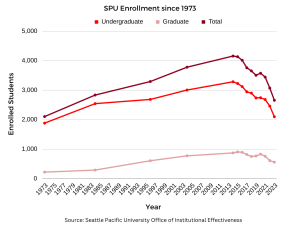Curse of Ashton Hall
Apathy grows abundant with COVID-19 scares
October 22, 2020

Ashton Hall has been dubbed the COVID Hall at Seattle Pacific University by many. It seems that every other week, there is one floor quarantined due to someone showing symptoms. One of the only ways other floors get news of quarantined floors is by stepping into the elevator that is overwhelmed with cleaning chemicals and blue duct tape covering a button to the floor.
Living in Ashton Hall is far from dull, but I wish when we have a hall in quarantine, people wouldn’t have an attitude like “come on, not again.” People think that way until they are actually quarantined. Instead of people thinking of quarantine as an annoyance, it should be a wake-up call to take the rules seriously.
According to the school website, four students have tested positive for COVID-19 since the beginning of the school year. About two weeks into the school year, the first COVID-19 scare hit Third West of Ashton Hall.
“I didn’t really know what was going to happen, since we were the first ones to be quarantined,” said first year business major, and resident of Third West, Jenna Gillam.
Gillam was outside of the building when she first received the email that someone was showing symptoms of COVID-19 and everyone had to immediately return to the dorm. When Gillam returned, she came back to an unfamiliar scene as people in hazmat suits cleaning the common spaces.
The main rule that the residents on the floor had to follow was that they couldn’t leave the floor, and could only leave their rooms to go to the bathroom and to pick up bags of food that staff had left for them. Despite the stress of the situation, residential life leadership handled it really well.
“Our RA didn’t stress us out, and made the rules really clear,” Gillam said.
However, even though Third West was out of the spotlight, soon Fifth East, Sixth East, and Second West had to be quarantined, and one had a positive case of COVID-19.
Next, Sixth East had to quarantine.
First year English major Anna Buzitis was in a Zoom session in her dorm when she received news that someone was positive for COVID-19. “They didn’t tell us until the person was positive,” said Buzitis.
Immediately, the whole floor was on lockdown.
But communication was an issue during the quarantine. With the help of social media, students were able to inform other students of COVID-19 cases. Students wanted to be in the know, and faculty wasn’t telling anyone outside of the hall anything.
Being stuck in a dorm because of a positive test, especially at the beginning of the year is awful. You’re forced to drop everything; people had plans to make friends and all of that was put on hold.
The entire floor had to quarantine for two weeks, it was practically prison. During the time she had to quarantine, Buzitis had to order food from Gwinn, and people would deliver meals only once a day.
“One of the dinners was just three slabs of unseasoned, cold chicken,” said Buzitis.
Residents would often get the wrong food or none at all. The lack of communication only made the quarantine worse.
To add insult to injury, students were cheated out of the first couple of weeks of college. The first couple of weeks are crucial for freshmen; it’s their chance to find a group of friends and do fun things.
Buzitis’s dorm overlooked the parking lot, and she was able to see other people leave their dorms with their friends.
“I would see everybody leaving, and wishing I could do that,” Buzitis said.
But then, after 14 days of anticipation, the residents of Sixth East were released from quarantine, and ready to enter the outside world once again.
Since Sixth East was released from quarantine, three other floors in Ashton have had to quarantine as well.
Seeing the elevator buttons covered with duct tape has become a normal occurrence, but the reality of quarantines hasn’t made people more careful.
Every building, every floor has a chance of getting quarantined, and after hearing what it’s actually like to be under dorm arrest, people should have an incentive to social distance and follow the guidelines better.
Instead of having to quarantine until test results come back, Seattle Pacific changed protocol so that students only have to quarantine if the person tests positive. These changes have been made due to the feedback of students.
“I wish they had been more clear,” said Gillam.
“None of my professors knew my floor was quarantined; I missed a class because they didn’t know I needed the Zoom link. They could inform the professors about the quarantine,” Buzitis said.
Gillam pointed out, “With cold weather approaching, we’re probably going to be in more quarantines because of the flu and colds.”
Hopefully, with the changes implemented, the curse of Ashton Hall can be broken.


























































































